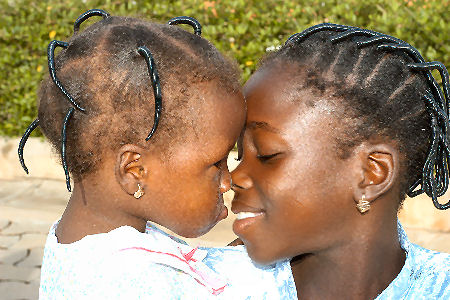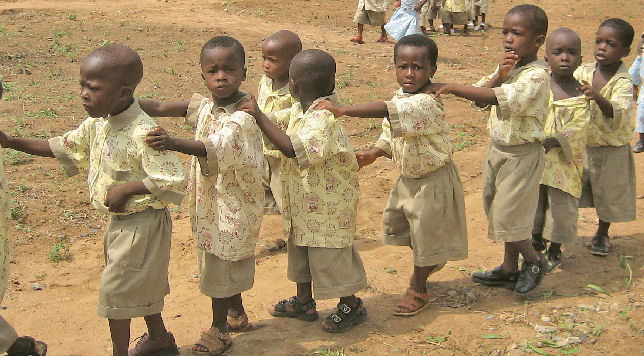Benin: News from Sponsored Village
18/10/2007

News from the Village
11-year-old Amelie* explains how important the Children’s Village is to her:
‘We arrived at the village on 22 October 2005 at night. I was accompanied by the social worker who found me in our village where I was living
Once at the [children’s"> village, I was first impressed by the family houses. All of them were beautiful and looked the same. We met the village director who showed me my family house.
‘There I found my mother and two other children who arrived in the morning. As soon as my mother saw me, she came towards me and took me in her arms
She gave me new clothes which were clean. She also asked me to wash my hands and join the others for dinner. Then I went to bed.
‘Today, we are seven children in our family house. There are two girls and five boys. I love life in the village because we have enough food and we also have swings.’
*Amelie’s name has been changed to protect her privacy
The youngest child at the Children’s Village is just one, and the oldest is twelve. Of the 97 children living in the 12 family homes, two attend secondary school, 76 go to the SOS Primary School, 12 little ones are enrolled at the SOS Nursery School, and seven are too young to go to school.
The sports-mad children have formed their own little basketball team, and as they were so keen to improve their skills, a coach comes to teach them twice a week. And, as at every other SOS Children’s Village in Africa, football is very popular and the children play together whenever they can.
During the heat of the average Beninese day, it can be too hot to be indoors. Three large grass huts are currently being constructed so the children have somewhere cool, and out of the sun, to play in or do their homework.
Benin is a Francophone country, but the older children do recognise how important it is to speak English too. Some of the more academic children were recently given the chance to go to Ghana to improve their English skills, and they loved it!
Nursery School

54 little children, 42 of whom are from the local community, attend the SOS Nursery School which stands in the Village grounds. They have all been learning how to make friends by gardening, playing games, painting and watching cartoons. And they are becoming computer literate as the school has recently purchased a few computers.
This SOS Nursery School is regarded as the top pre-school in the region.
Getting children’s education back on track at the SOS Primary School
Many of the children who come to the Village have missed out on a lot of their education. Some couldn’t afford the school fees, or they had to work to earn money for their families. Others will have come from rural areas where there weren’t any schools. So we were really pleased when, with lots of support, 75% of them passed their recent end-of-year exams! And 100% of them passed their Year Six exams, meaning they could progress to secondary school. The SOS mothers were so proud. Extra tuition is being given to those children who are still finding their school work difficult.
Social and medical care in the community
Over 2,700 adults and children visited the SOS Medical Centre in Dassa last year; 39% of patients had malaria and a smaller percentage were HIV+. The haematology lab is able to confirm HIV status. The centre also helps people sort out their health insurance and legal paperwork, which is a vital lifeline to families who couldn’t otherwise access any healthcare. The SOS Medical Centre works with the local hospital on serious cases.
Due to poverty and illness, the number of children without the support of their natural family is increasing steadily. The aim of our Family Strengthening Programme (FSP) in Dassa is to respond realistically and effectively to the situation of orphans, vulnerable children and their families and to prevent child abandonment. Through skills training, literacy classes, education, counselling and improved nutrition the families know they can become independent, self-reliant and confident in their own ability to provide for the children in their care. Over 200 children and their families benefit from the FSP; 18 of the families are AIDS-affected.
39 of the children on the programme were not registered at birth. This leads to legal complications when they are older, for example, they may be refused state healthcare as they cannot prove they are a full citizen of Benin. We have carried out the paperwork for them, so they are now registered.
Parents, mostly mothers, have benefited from the adult education programmes on the FSP. They now possess more market skills and have been able to start their own businesses (we offer microloans too) or obtain local employment. This means they can support their own children, and this in turn increases confidence, self-esteem and stability.
Relevant Countries: Benin.